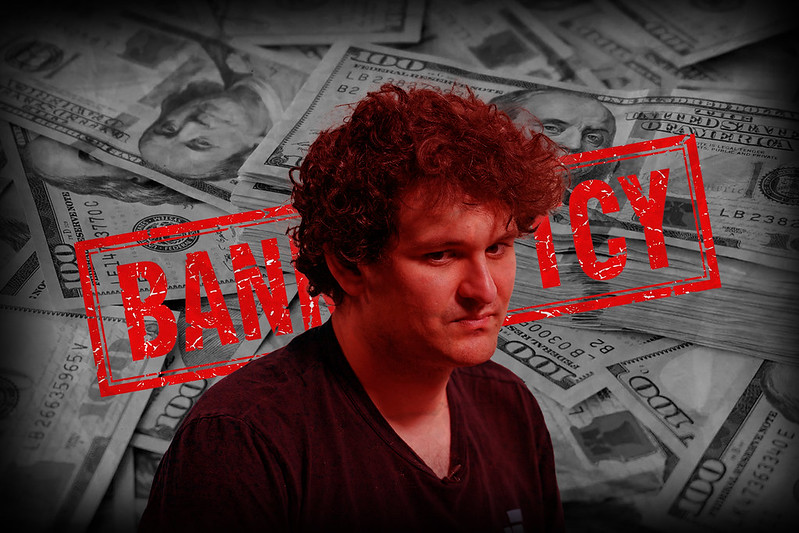FTX Fallout Brings Chaos to Crypto Exchange
Sam Bankman-Fried, the former CEO of FTX, has been largely blamed for the collapse of the FTX exchange
February 3, 2023
FTX, short for “Futures Exchange,” was once the fourth-largest cryptocurrency exchange in the world. However, it recently declared bankruptcy and was accused of misleading business practices by the Federal Trade Commission, which sent shockwaves through the cryptocurrency world.
Sam Bankman-Fried and Gary Wang founded the FTX cryptocurrency exchange in May 2019. In July 2021, FTX raised $900 million at an $18 billion valuation from over 60 investors. In the three years since its inception, Sam Bankman-Fried has turned the exchange into a $32 billion company, doubling its initial valuation and raising $400 million in funding in January 2022. They expanded their range to include prediction markets, leveraged tokens, tokenized stocks, volatility products, crypto derivatives, OTC, and pre-IPO tokenized stocks. The token created by FTX, known as FTT, started trading below $4 in December 2020 and surged to a high of $85 in December 2021.
In November 2022, information was made public regarding the finances of Alameda Research (the trading firm founded by Bankman-Fried) and their connections to the FTX exchange. Reports suggested that a significant portion of Alameda’s assets were held in FTT, leading to speculation that the two firms were too closely linked and could violate U.S. regulations. On November 6th, Changpeng Zhao, the CEO of Binance (the largest cryptocurrency exchange in the world) announced that the exchange would sell all of its significant holdings of FTT. Fifteen minutes later, the CEO of Alameda Research, Caroline Ellison, responded that her firm would buy the tokens from Binance for $22 each. This announcement caused the value of FTT to drop significantly; by November 8th, it had fallen to less than $6.
On the same day, Zhao announced that Binance had agreed to buy FTX, pending a check of the exchange’s finances as part of “due diligence.” On November 9th, Bloomberg reported that U.S. federal agencies were investigating FTX, and the same day, Binance announced that it had decided to liquidate the remaining FTT on its books. On November 16, Bankman-Fried announced that he had resigned as CEO of FTX and that the exchange had declared bankruptcy. He also said that FTX had stopped people from withdrawing money from the exchange in the days before the announcement. When this news came out, the value of the crypto sector dropped by 12%. This shows how much the collapse of FTX affected the industry as a whole.
On December 13, 2022, the Federal Trade Commission filed a complaint against FTX, seeking a permanent injunction and monetary damages. The complaint says that the company didn’t give enough information about the risks and costs of its products and services, which could have misled investors. The Federal Trade Commission is also accusing FTX of not being registered with the agency.
This news has caused a great deal of uncertainty in the cryptocurrency industry, as investors are now questioning the potential impact of FTX and the Federal Trade Commission’s action on the future of the industry.
Oliver Jones, the leader of Stocks and Finance club at Masters, says that this type of fraud is not an unexpected outcome in the cryptocurrency space, “Since there are no regulations and it’s so decentralized, I personally feel that makes it much more chaotic. It makes it more risky.” Cryptocurrency is largely considered to be an unregulated asset class due to the decentralized nature of the technology. Some countries have attempted to impose regulations on cryptocurrency, but the lack of a central authority and the global reach of the technology make it challenging to enforce these regulations.
Although the collapse of FTX has caused great chaos and affected many different parts of the cryptocurrency market, Jones is not convinced that this will necessarily turn people away from cryptocurrency, “This is a major low in the cryptocurrency world right now, but that might also convince some people to actually get in since you want to buy low and sell high.” Investing in cryptocurrency is generally considered to be more risky than investing in traditional assets such as stocks or bonds. Cryptocurrency prices are known to be highly volatile, meaning that they can fluctuate dramatically in a short period of time. This can result in large losses for investors.
Ultimately, the most effective strategies for avoiding similar events and fraud in the cryptocurrency space is just making informed decisions. Before investing in anything, it’s important to take the time to research the opportunity thoroughly. Look for information from trusted sources such as government agencies, financial institutions, and established financial publications. “When you research a company, there’s quantitative data – income, revenue, you need to see they’re growing year after year. I look at these and see how their management is like, I see how they do in a recession,” Jones said.
Additionally, not investing into cryptocurrency coin or with a single company decreases the risk of potentially losing large amounts of money to fraud. “One investment strategy that I believe in is dollar cost averaging, which is instead of pooling all of your money and investing it right away, you spread it out and invest a certain amount every month. So, over time, no matter what happens with the fluctuations, you’ll be less affected by it in the long run,” Jones said.




























